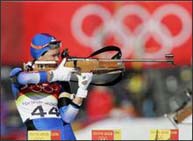Russian biathlete kicked out of Olympics for doping
The Winter Olympics got its first doping scandal Thursday when Russian biathlete Olga Pyleva was stripped of the silver medal she won three days earlier and kicked out of the games for doping.

In the Italian Alps, Estonian cross-country skier Kristina Smigun won her second gold of the week and Seth Wescott gave the United States its third snowboarding gold in as many events when he won the inaugural snowboardcross.
Back in Turin, the Italian men's speedskating pursuit team sent the Olympic host nation into raptures with an unlikely run to gold beating the United States, Netherlands and Canada on the way. The women's pursuit had a far more predictable winner powerhouse Germany.
With Pyleva out of the women's 7.5-kilometer biathlon sprint, Florence Baverel-Robert of France was a surprise winner.
Maya Pedersen, who hung up her sled to become a mother two years ago, won the gold in skeleton for Switzerland the Alpine country's first of the Turin Games.
Later Thursday, Evgeni Plushenko of Russia was the favorite to take the men's figure skating gold after opening up a commanding lead in the short program on Tuesday.
Pyleva, who won silver in the 15km event Monday, was scratched from the field before the start of the 7.5km sprint, in which she was considered a leading medal contender. She also won gold and bronze medals at the 2002 Salt Lake City Games.
A hastily convened, three-member IOC panel found Pyleva guilty of a doping violation. She tested positive for the banned stimulant carphedon in a urine test following Monday's race.
Nikolai Durmanov, head of the Russian Anti-Doping Committee, said a doctor who treated her for an ankle injury in January gave Pyleva an over-the-counter medication that did not list carphedon as one of its ingredients.
"This was 100 percent the physician's mistake," Durmanov said.
Martina Glagow of Germany, who finished third in the 15km, will be awarded the silver. Albina Akhatova, Pyleva's Russian teammate, goes from fourth to bronze.
"It's a bad thing that somebody is testing positive, but it's a good thing we got her," World Anti-Doping Agency chief Dick Pound said.
The IOC has conducted 380 tests since the athletes' village opened Jan. 31; Pyleva is the first to be caught by the IOC's most rigorous doping control program ever at a Winter Olympics. A total of 1,200 samples are being tested, a 72 percent increase over the number in Salt Lake City, where there were seven doping cases total.
At the Lingotto oval, Italy's pursuit trio got past the Netherlands in the semifinals when two Dutch skaters fell. They then powered away from Canada for gold.
"They had a very difficult draw _ first they had to beat the Americans, then us and now the Canadians," Dutch skater Erben Wennemars said. "They did fantastically well."
In Pyleva's absence, Baverel-Robert crossed the line first, followed by Anna Carin Oloffson of Sweden and Lilia Efremova of Ukraine in third.
In the final race of the snowboardcross, Wescott took the lead over silver medalist Radoslav Zidek of Slovakia with a deft passing move in the middle of the course and led the rest of the way, just beating Zidek past the finish line. Paul-Henri Delerue of France took bronze.
"I just knew if I was patient and confident that I'd reach the part of the course that I could work a little better, catch the speed on him," Wescott said. "Then coming into that one turn, I dove the inside line on him like clockwork. That's how it worked out."
In the women's 10K classical cross-country race, Smigun, who won the 15K pursuit on Sunday, took the lead by the 7-kilometer and finished in 27:51.4, a commanding 21.3 seconds ahead of World Cup leader Marit Bjorgen of Norway. Hilde Pedersen of Norway took the bronze, reports AP.
O.Ch.
Subscribe to Pravda.Ru Telegram channel, Facebook, RSS!




